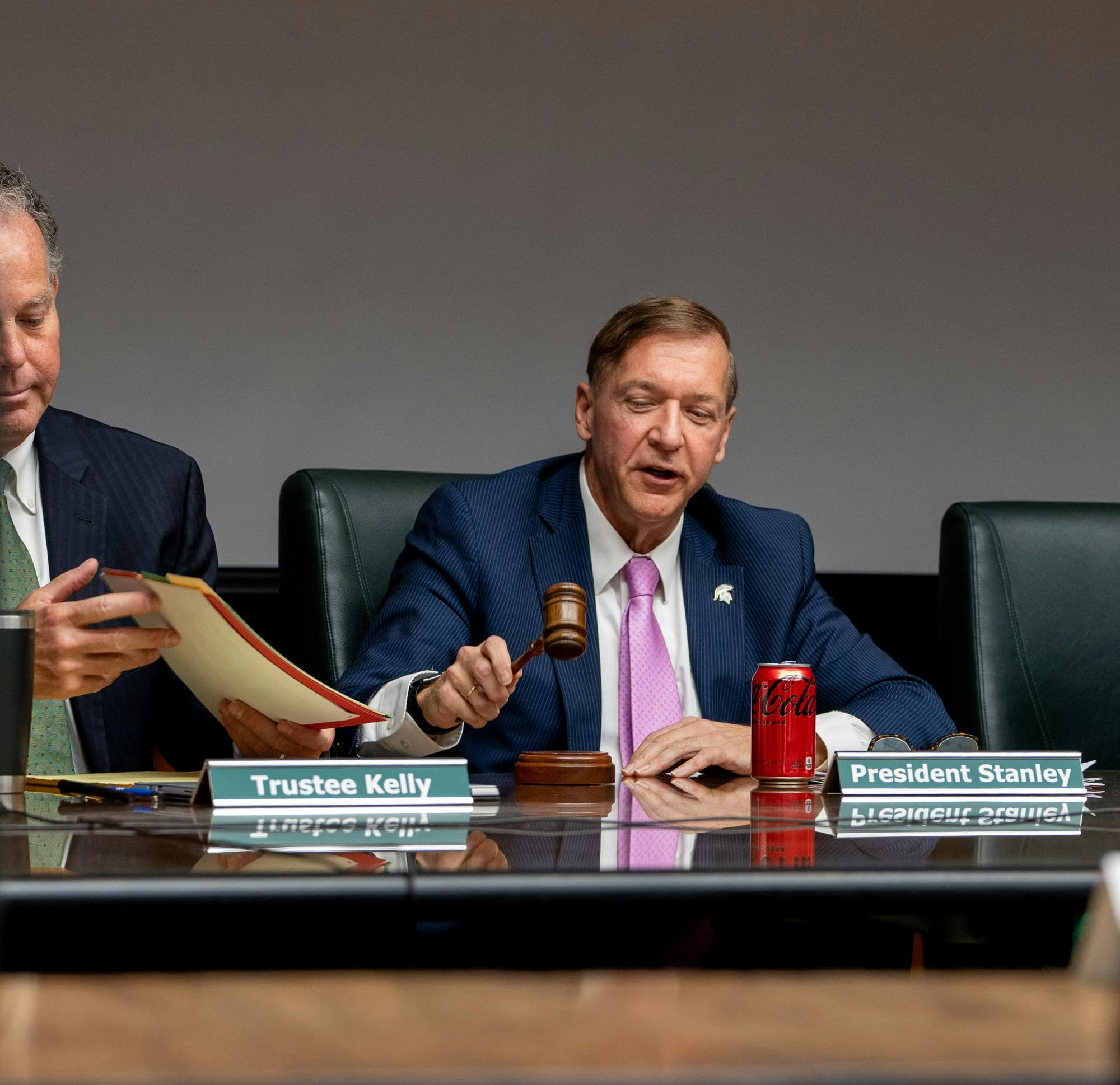After news broke that President L. Stanley Jr.’s contract was under discussion with the Board of Trustees, a group of high-ranking MSU professors wrote and circulated an open letter to the board in support of Stanley — the letter gained 94 signatures within 12 hours.
"We, the undersigned 94 Distinguished and Endowed Chair Professors and Distinguished Professors Emeriti of Michigan State University, write to express our wholehearted support for President Stanley's leadership of our institution; and likewise to express our dismay with the actions of various Trustees over the past week, which may harm MSU's internal morale and external reputation," the letter began.
“This was meant to be an expression of disappointment at the way some people are trying to conduct business at the university,” physics and astronomy professor Raymond Brock said. Brock was one of the letter’s three main co-writers.
Brock said he is not looking to inflame the situation during what he called a delicate time for the university, and that he only seeks a return to normality for the university.
Professor Felicia Wu of MSU’s Department of Food Science and Human Nutrition was also a main co-writer of the letter.
“When we heard about this leak, we were blindsided and we didn't know what was going on,” Wu said, referring to an article published on Sept. 11 in which a source not authorized to speak to the press said Stanley was asked to retire by board chair Dianne Byrum and vice chair Dan Kelly.
Byrum disputed this claim in a press release a day later. Seeking transparency, Wu gathered a group of highly ranked professors to write the letter.
“We collectively have had decades, if not hundreds of years of experience at MSU and in our individual research areas, where we're known nationally, and in some cases internationally,” Wu said. “We understand how important it is to have an environment that's safe and conducive to research and teaching and professional service.”
Wu said she did not want to “add any sort of fuel to the fire,” after a relatively quiet week following the release of the letter.
“We just want to express our support," Wu said. "What we want is calmness."
Professor Victor DiRita, of MSU’s Department of Microbiology & Molecular Genetics and the letter’s third co-writer, said his motivation for the circulation of the letter resulted from what he considered to be unprofessional behavior by the board. DiRita took issue with trustees speaking as individuals, calling the board’s behavior “reprehensible.”
“It's just not the way the board is supposed to behave,” DiRita said.
In addition to criticizing the board’s lack of transparency, the letter’s authors wanted to express support for Stanley, including his response to the COVID-19 pandemic. Wu said they appreciate his leadership.
“When President Stanley had taken over, even with the pandemic, he made this a safe environment, and a productive environment for us to work,” Wu said. “We really appreciated that, and so we wanted to share that perspective.”
Brock said the letter was meant to suggest Stanley has the confidence of the faculty. He said he would not have taught in person last fall if protocols to protect students, faculty and staff against COVID-19 had not been put in place.
“We were pleased with what the administration did, especially our MD infectious disease expert president,” Brock said in reference to Stanley, who graduated from Harvard Medical School and has a background in infectious diseases research. “We thought that that probably spoke well for the president's willingness to do what needed to be done in face of both controversy as well as real concern for the safety of the students and faculty.”
All three co-writers expressed concern for the reputation of the university in light of leaks to the press.
“We want to attract great students, we want to attract great faculty and administrators,” Wu said.
However, Brock and Wu both agreed they did not want to exacerbate the situation, and while they said they thought the press leaks likely came from somewhere close to the board, they did not attribute the press leaks to the board directly.
“Things seemed to have quieted, and we’re in a wait-and-see mode," Wu said.
Support student media!
Please consider donating to The State News and help fund the future of journalism.
DiRita said he did not expect a response from the university and said it was “perfectly fine” that the letter did not receive one.
However, Brock and DiRita said they received positive reactions from fellow faculty members.
“The water was boiling, I think people were ready to really release a lot of steam and I think the letter helped people do that,” DiRita said.
Brock said he has received thanks from faculty members for his circulation of the letter.
“We want things to just go back to being normal,” he said.
DiRita said he wants to see the board act responsibly and as one unified voice. He said the state of Michigan should consider reforming how university boards are put together, aiming to assemble them based on particular skills, traits, and experiences.
“Our desire, really, is to restore the campus to peace, to calmness, and to good leadership,” Wu said.
Discussion
Share and discuss “Professors who wrote letter call out board's "reprehensible" behavior” on social media.





